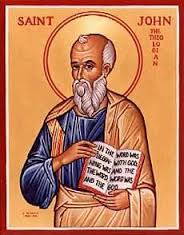By: Brian Chilton | June 26, 2017
For the past few weeks, we have investigated the authors of the Gospels and the book of Acts. In this article, we examine the evidence for the Gospel of John. Who wrote the Fourth Gospel? As we have in previous articles, this article will look at the proposed author, the internal and external evidences for authorship, the dating, and the location and intended audience for the Fourth Gospel.
Proposed Author by Tradition: Church tradition claims that John the apostle wrote the Fourth Gospel while pastoring as an aged man in Ephesus. Does the evidence back up this assumption?
Internal Evidence: Internally, as the other Gospels, the author is unnamed. However, a clear reading of the Fourth Gospel denotes that the one named the beloved disciple, or the disciple whom Jesus loved, is also the author of the book. The phrase “the disciple whom Jesus loved” appears 5 times in the Fourth Gospel. This disciple holds a prominent role even to the point that Peter asks about the beloved disciple’s ministry in John 21., son of Zebedee, meets this criterion as well as James, the brother of John. We know that James, son of Zebedee, died in the 40s AD (Acts 12:1-5). The beloved Jesus appears with Peter in 13:23-24; 18:15-16; 20:2-9; and in chapter 21. John is also found with Peter in Luke 22:8; Acts 1:13; 3-4; 8:14-25; and Galatians 2:9. So, only John meets the criteria needed for the Fourth Gospel’s authorship. The question of Peter in John 21 indicates that the author was aged and reflecting back on his life with Jesus and the apostles.
External Evidence: Referencing the Fourth Gospel’s author, early church father Irenaeus (c. 130-202 AD) writes,
Further, they teach that John, the disciple of the Lord, indicated the first Ogdoad, expressing themselves in these words: John, the disciple of the Lord, wishing to set forth the origin of all things, so as to explain how the Father produced the whole, lays down a certain principle,—that, namely, which was first-begotten by God, which Being he has termed both the only-begotten Son and God, in whom the Father, after a seminal manner, brought forth all things. [1]
Clement of Alexandria (c. 150-215 AD), as quoted by the church historian Eusebius of Caesarea (c. 263-339 AD) denotes the following:
Again, in the same books Clement has set down a tradition which he had received from the elders before him, in regard to the order of the Gospels, to the following effect. He says that the Gospels containing the genealogies were written first, and that the Gospel according to Mark was composed in the following circumstances:—
Peter having preached the word publicly at Rome, and by the Spirit proclaimed the Gospel, those who were present, who were numerous, entreated Mark, inasmuch as he had attended him from an early period, and remembered what had been said, to write down what had been spoken. On his composing the Gospel, he handed it to those who had made the request to him; which coming to Peter’s knowledge, he neither hindered nor encouraged. But John, the last of all, seeing that what was corporeal was set forth in the Gospels, on the entreaty of his intimate friends, and inspired by the Spirit, composed a spiritual Gospel.[2]
Ignatius of Antioch (c. 35-108 AD) quotes John’s Gospel quite frequently as he writes an epistle to the Antiochians. Ignatius’s quotation of the Fourth Gospel illustrates that the book was viewed in a positive light and authoritative. Ignatius is noted as a disciple of John the apostle along with Polycarp. The Marytrdom of St. Ignatius notes the following:
Wherefore, with great alacrity and joy, through his desire to suffer, he came down from Antioch to Seleucia, from which place he set sail. And after a great deal of suffering he came to Smyrna, where he disembarked with great joy, and hastened to see the holy Polycarp, [formerly] his fellow-disciple, and [now] bishop of Smyrna. For they had both, in old times, been disciples of St. John the Apostle. Being then brought to him, and having communicated to him some spiritual gifts, and glorying in his bonds, he entreated of him to labour along with him for the fulfilment of his desire; earnestly indeed asking this of the whole Church (for the cities and Churches of Asia had welcomed6 the holy man through their bishops, and presbyters, and deacons, all hastening to meet him, if by any means they might receive from him some spiritual gift), but above all, the holy Polycarp, that, by means of the wild beasts, he soon disappearing from this world, might be manifested before the face of Christ.[3]
Much more could be given as far as external evidence. However, the presented information should suffice for our purposes.
Date: Evidence suggests that John’s Gospel was the last to be written at some point after 70 AD. It appears that John may have been written in the mid-80s to early 90s as he may have served as pastor of the church of Ephesus.
Location and Audience: John’s testimony is preserved while serving in Ephesus in Asia Minor. Thus, he writes to the people of that area, but also to the future generations of the church. Perhaps this is why Clement of Alexandria calls it a “spiritual gospel.”
Conclusion: I believe that John the apostle authored the Gospel by dictation. That is to say, John most likely provided the material to an amanuensis. The amanuensis documented the aged apostle’s words and added the addendum to the Fourth Gospel and the title “the disciple whom Jesus loved” in reference to the apostle. I think the evidence is quite strong for John the son of Zebedee authoring the Fourth Gospel. Claims to the contrary[4] bring more questions than answers. Such as, why do the other Gospels not elevate the other suggested candidates to a higher light? How is it that John is an inner circle disciple in the other Gospels and is missing in prestige in the Fourth Gospel if John is not the author?[5] To reiterate, I believe an amanuensis was employed in the Gospel’s formation. But the use of an amanuensis does not negate the apostle’s hand in writing. So, for those who erroneously claim that the apostle could not have formed a document such as this, such an argument is dispelled if an amanuensis is employed. It is still quite possible with the knowledge obtained by Jesus and his earlier employment that John, son of Zebedee, could have written the entire Gospel by hand. But, I prefer to think that an amanuensis was employed.
Notes
[1] Irenaeus of Lyons, “Irenæus against Heresies, 1.8.5.” in The Apostolic Fathers with Justin Martyr and Irenaeus, ed. Alexander Roberts, James Donaldson, and A. Cleveland Coxe, vol. 1, The Ante-Nicene Fathers (Buffalo, NY: Christian Literature Company, 1885), 328.
[2] Clement of Alexandria, “Fragments of Clemens Alexandrinus,” in Fathers of the Second Century: Hermas, Tatian, Athenagoras, Theophilus, and Clement of Alexandria (Entire), ed. Alexander Roberts, James Donaldson, and A. Cleveland Coxe, trans. William Wilson, vol. 2, The Ante-Nicene Fathers (Buffalo, NY: Christian Literature Company, 1885), 580.
[3] Alexander Roberts, James Donaldson, and A. Cleveland Coxe, eds., “The Martyrdom of Ignatius,” in The Apostolic Fathers with Justin Martyr and Irenaeus, vol. 1, The Ante-Nicene Fathers (Buffalo, NY: Christian Literature Company, 1885), 130.
[4] Ben Witherington, III holds that Lazarus was the author of the Fourth Gospel.
[5] For instance, it seems clear that the beloved disciple was one who was prominently known. John the apostle holds such a status.
About the Author:
 Brian Chilton is the founder of BellatorChristi.com and is the host of The Bellator Christi Podcast. He received his Master of Divinity in Theology from Liberty University (with high distinction); his Bachelor of Science in Religious Studies and Philosophy from Gardner-Webb University (with honors); and received certification in Christian Apologetics from Biola University. Brian is currently working on his Ph.D. in Theology and Apologetics at Liberty University. Brian is a full member of the International Society of Christian Apologetics and the Christian Apologetics Alliance. Brian has been in the ministry for over 14 years and serves as the pastor of Huntsville Baptist Church in Yadkinville, North Carolina.
Brian Chilton is the founder of BellatorChristi.com and is the host of The Bellator Christi Podcast. He received his Master of Divinity in Theology from Liberty University (with high distinction); his Bachelor of Science in Religious Studies and Philosophy from Gardner-Webb University (with honors); and received certification in Christian Apologetics from Biola University. Brian is currently working on his Ph.D. in Theology and Apologetics at Liberty University. Brian is a full member of the International Society of Christian Apologetics and the Christian Apologetics Alliance. Brian has been in the ministry for over 14 years and serves as the pastor of Huntsville Baptist Church in Yadkinville, North Carolina.
© 2017. BellatorChristi.com.





